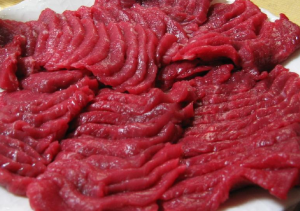
Horses have been a part of human society for thousands of years. They have been our vehicles, tools, and companions. Yet despite the fact that these animals are technically categorized as livestock, eating horse meat is still considered taboo in the United States.
Horse meat is uncommon in this country, but it is found on restaurant menus throughout Europe and Asia. In many of these countries, horse meat is not only tolerated, but enjoyed. Beginning in the early 1970s, the United States shipped horse meat to these continents.
By 2006, approximately 150,000 horses a year were being sent to the three major equine slaughterhouses in the United States: one in Illinois and two in Texas. Gruesome images from inside equine slaughterhouses surfaced on the internet, and not long after, Congress cut funding for federal inspections at horse slaughterhouses, essentially ending the practice.
However, a report filed by the U.S. Government Accountability Office in June 2011 found that, since the ban of horse slaughter, the price of horses has gone down, reports of neglect and abuse have gone up, and there has been an increase in horses shipped to Canada and Mexico, where horse slaughter is still legal. When President Obama signed the agricultural spending bill in November 2011, he reinstated the funding for slaughterhouse inspections, restoring both the practice and the controversy that goes with it.
It is now up to individual states to allow or forbid horse slaughter for human consumption. Already there are plans to open an equine slaughterhouse in New Mexico. In California, horse slaughter and selling or purchasing of horses with the intention of slaughter has been illegal since voters approved a ballot initiative in 1998. However, the state may still play a role in creating horse meat.
Valeria Pringle, a horse specialist with the Humane Society, said that many horses bought at auction in California are shipped to Mexico or Canada, where slaughter is still legal,and is largely unregulated. Some experts argue that allowing horse slaughter in California could enable better control and regulation, ensuring the animals are treated humanely and the meat produced safely. That need has become more acute, they say, since the economic downturn has forced many horse owners to sell horses they can no longer afford.
Shawn Mott, founder of the Chaparral Corporation horse riding and boarding center in Milpitas, says he has seen the effects of the downturn first hand. Feed and board for a horse can cost more than $400 a month, not including regular shoeing, unexpected veterinary bills and other expenses. A few years ago, Mott said, people were selling their horses for whatever money they could get or even giving them away, simply because they could not keep up with the costs of ownership.
And without the horsemeat market, Mott said, many of the horses are left with nowhere to go. There are nonprofit rescue groups that will take in elderly and unwanted horses, but they fill up quickly and are expensive to maintain because the horses are often sick or injured. Mott said he has a hard time thinking of any type of slaughter as humane, but doesn’t see why horses should be an exception.
The Humane Society has maintained a different standpoint on the matter. Pringle calls the practice unacceptable. One reason, she said, is that horses are built and behave differently than other livestock, such as cattle. She described cows as “short necked and stoic,” while the long necks of horses coupled with their intense flight instinct makes them much more difficult to restrain and stun humanely.
That opinion is widely shared. The ASPCA conducted a poll last January in which 80 percent of the Americans interviewed stated they were against horse slaughter.
“I think it comes down to whether we as a culture want to accept it,” said Jeremy Hsu, a Stanford student and self-described vegetarian. He cited other places where eating cats or dogs is culturally acceptable.
Hannah Kim Frank, another Stanford student, echoed this sentiment. “When I first found out they used horse meat in zoos, I was shocked,” she said. It took some time, but while working at a zoo, she became accustomed to the idea of horse meat as food for zoo animals and said she is no longer offended by it.
Mott said he agrees that the slaughtering of horses for meat is much more “emotional” than slaughtering a cow or a sheep, but many think he is right in saying “it’s almost a necessary evil.”
